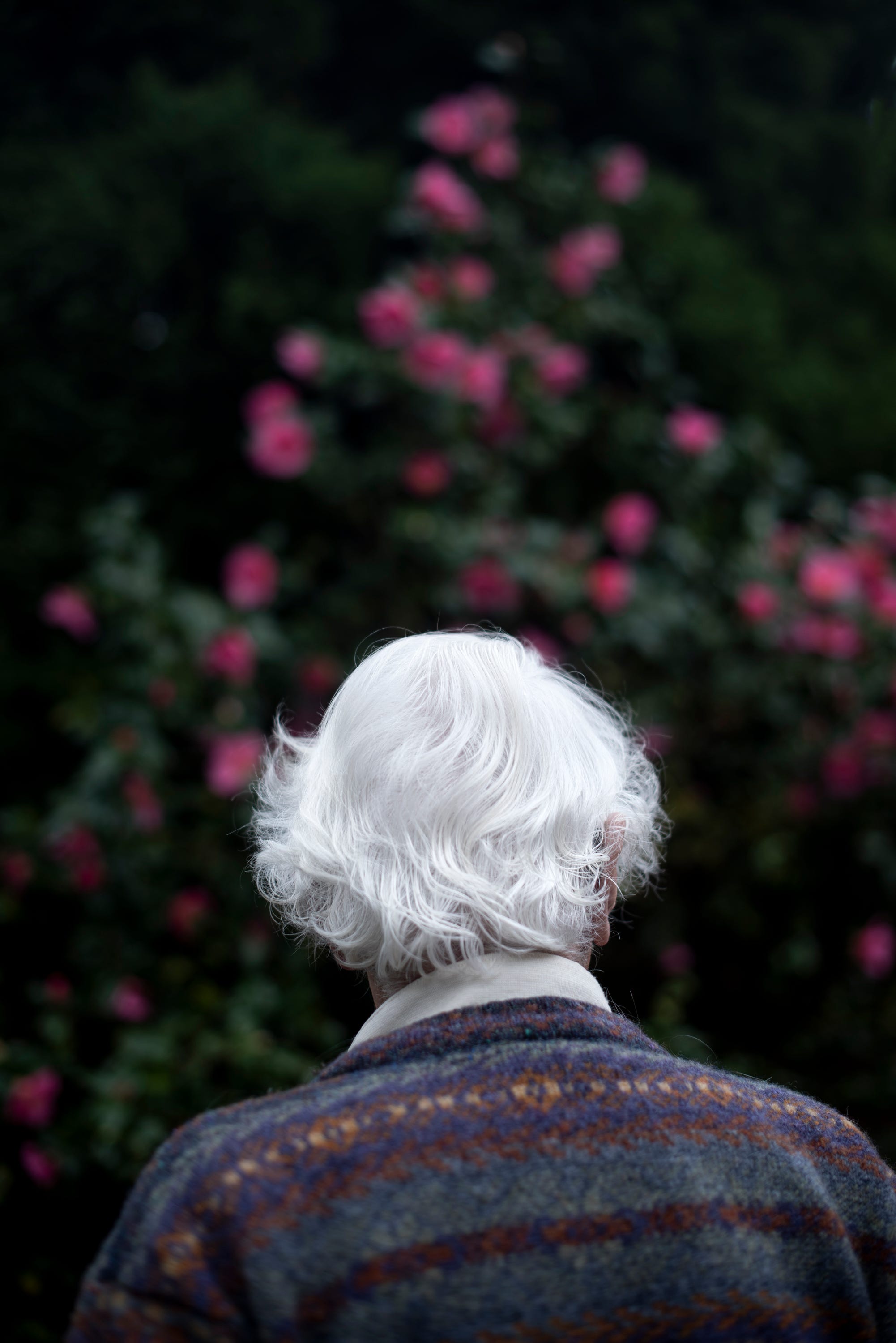Last year, I mentioned that I wanted to publish photography stories here. I’m sure this will evolve, and based on your feedback, many of you liked the idea, so here we go! I know some of you are photographers. Please drop me a line if you have a photography story to tell and want to collaborate. You can email me anytime.📸
For reasons I can’t explain, I have always loved rear-view portraits. It’s a popular motif in photography and one I’ll probably always enjoy. There’s something powerful about not being able to see the subject’s face. That’s why I asked Colin Pantall to tell me the story behind this picture of his mother in the garden.
His response may surprise you. It turns out this image contains multitudes, and Colin describes it well. I’ll let him take it from here:
This is my mother, almost four months after my father died.
Her husband of 64 years.
Three months is a short time but a long time. A long time but a short time.
My mother asked me to take pictures of her after my dad died. She asked me to take pictures of him dead in the hospital, in the coffin at the funeral home.
She has one of those pictures by her chair. It’s of her stroking his face as he lies in peace in the funeral home.
She asked me to take pictures of her mourning, holding the last flowers she bought for him, standing in the garden with red-rimmed eyes.
This picture shows the back of her head. It’s spring, and the camelia is blooming. It’s the consolation of a change in season, a lightening of the sky, an end to the rain and the cold. It’s a photograph of loss, of mourning, of death, of the entropy of life.
And it’s a comfort.
Photography is so often a comfort. It’s a comfort to my mother, it’s a comfort to me, it’s a comfort to so many people who use photography to understand the world around them, the people around them, the loss around them. It’s a ubiquitous thing that we see relatively little of.
People make pictures showing what was and what isn’t anymore. In a photograph, you can see the pain and suffering but also the peace, the inevitable nature of what is happening. You can see the otherworldly nature of grief in a picture and remember that time. You can never get that time back, but you can recreate a story from it. You can understand that time has passed, things have changed, and life has moved on.
There is a lot of love in grief, and there is a lot of love in the photography of grief.
About the photographer
Colin Pantall is a photographer, writer, and educator based in Bath, England.
His work focuses on his immediate domestic environment and includes his book All Quiet on the Home Front, his publication Brexit Pictures, and his projects The Mental Load of Motherhood, Sofa Portraits, and My German Family Album.
He is interested in how environment, domestic space, and family narratives overlap and interfere with our understanding of personal, visual, and political histories.
For the book folks
I don’t have children, but they would most certainly watch television if I did. My sisters and I grew up in front of a TV, that campfire of the American home, and we loved it. Television informed my understanding of the world, and when I stumbled on the internet many years later, I fell in love with it for similar reasons — it was a portal to the cultural universe, a place to learn about things and be entertained.
I suspect that’s a common experience: many of us have similar memories of watching TV shows we loved alone or with friends and family. I’m reflecting on these things after reading Colin’s book, Sofa Portraits, again this morning. It’s a charming little book that shows images of his daughter, Isabel, watching television. You can interpret the pictures in any number of ways. I see them through a nostalgic lens: as someone with happy memories of watching TV as a kid and as a middle-aged man imagining what it must have been like for Colin to raise his daughter into her young adulthood.
Isabel, coincidentally, made the drawing and picture of Colin above. The book includes a short piece of her writing. You can read it on Colin’s website, and you should consider buying a copy if you’re looking for a new book! It’s a good one.
One more thing…
I’ll leave you with this beautiful portrait of Colin’s mother with her eyes closed. Please share this post if it resonates with you. Have a great weekend!









Wow! Such wonderful, moving words by Colin. Thank you for sharing!
Great post and thanks for the introduction to Colin's work.
It makes me think about what it means to photograph grief. I am currently traveling the US, a year after my daughter's death. I find myself photographing vast skies or forests, or the ocean. Places where I feel connected to my daughter's spirit. Others might just see pictures of landscapes; to me they're pictures of my grief.
Love your newsletter.